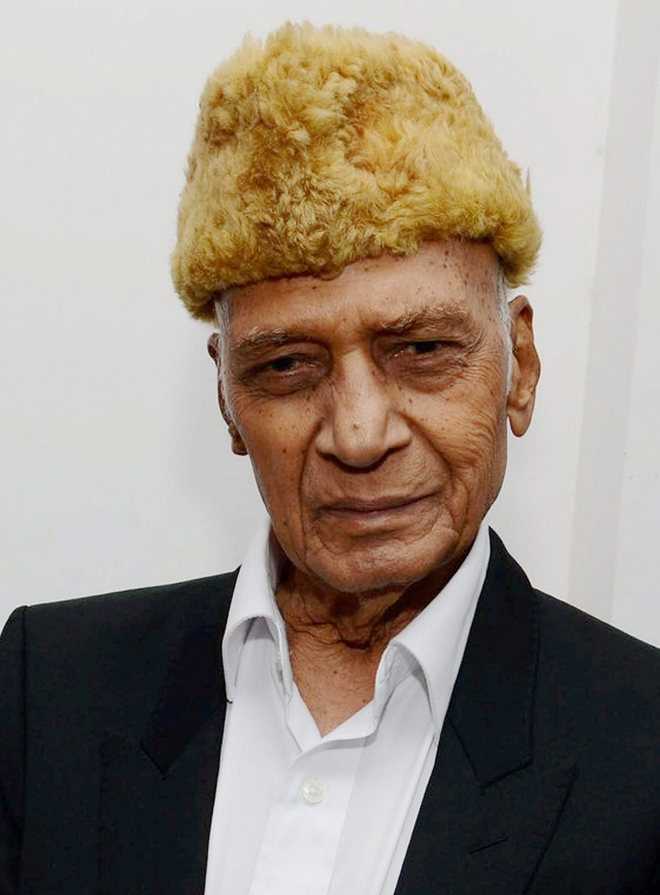ML Dhawan
Mohammed Zahur Khayyam Hashmi, who died at 92 last week, made his debut as a composer with Heer Ranjha (1948). His composition “Akele mein woh ghabratey to hongey” sung by Mohd Rafi in Biwi (1950) brought him to limelight. His ghazal composition “Sham-e-gham ki kasam,” sung by Talat Mahmood for Footpath (1953), catapulted Khayyam to dizzy heights. Later on in Phir Subah Hogi, Sahir’s evocative lyrics, “Woh subah kabhi toh aayege” and “Phir na keejey meri ghustakh nighahee ka gila” in the voice of Mukesh made it clear that Khayyam was no fluke composer.
Khayyam kept his tunes simple and instruments minimal. When the theme in his films was sombre, as was much of his music, Khayyam outclassed his peers. Starting with his fondness for Talat’s voice, Khayyam shifted to Rafi for putting over his songs for the hero. Rafi embellished many of his tunes like “Jaane kya dhondti rehtee hain” (Shola Aur Shabnam).
Khayyam was a perfectionist. Music and instruments mesh perfectly in his compositions. Kabhi Kabhie (1973) was Khayyam’s much-delayed vehicle to stardom. Yash Chopra wanted Laxmikant-Pyarelal who could do justice to the angst of the failed lover-poet hero but Sahir Ludhianvi put his foot down and Chopra risked Khayyam. “Main pal do pal ka shayar hoon”, “Kabhi kabhie mere dil mein” sung by Mukesh brought Khayyam the belated stardom. But it was Umrao Jaan put Khayyam in the category of ghazal composers like Madan Mohan, Naushad and Ghulam Mohammed. A hue and cry was raised when Khayyam opted for Asha, instead of Lata Mangeshkar. Khayyam said if he had opted for Lata, the film would have had a Pakeezah hangover. Khayyam won a National Award for scoring “Yeh kya jagah hai dosto”, “Justjoo jis ki thhi” for which he was most praised for.
Khayyam’s best efforts were reserved for the 1980s. In Baazar (1987), Lata and Talat Aziz sang the most lyrically beautiful duet, “Phir chhidi raat baat phoolon ki.” He continued to compose till the early 1990s but the soul was missing in the music of this decade. Kamal Amrohi’s Razia Sultan (1981) bombed at the boxoffice but Khayyam gave us another atmospheric beauty in “Aye dil-e-nadan”.
He also did a lot of non-film recordings with Talat Mahmood and Mohd Rafi. His “Aa gayeen phir se baharen aa gayeen”, “Ro ro beeta jivan sara” remain unforgettable. His compositions with Rafi such as “Ghazab kiya tere vaade pe”, “Yeh naa thhi hamari kismaat” are a landmark in the realm of ghazals.
Despite his long innings, commercial success evaded him. He was a misfit in the show business because composing for him was never a business. He also gave music for mega-serials like The Great Maratha, Dard, Sunhere Warq, Jai Hanuman and non-film albums of ghazals, bhajans.
Khayyam was a fascinating man who conducted himself with grace and style. His body language and expressions were extraordinary. He would raise one eyebrow while lowering the other and giving a sharp sideways glance. His hands and feet were always moving, up or down or circular as if busy with a tune. There were long stretches when he stayed silent but his innings with his quality work was what set him apart. He composed music just for 55 films but it continues to be appreciated even today.
Unlock Exclusive Insights with The Tribune Premium
Take your experience further with Premium access.
Thought-provoking Opinions, Expert Analysis, In-depth Insights and other Member Only Benefits
Already a Member? Sign In Now











